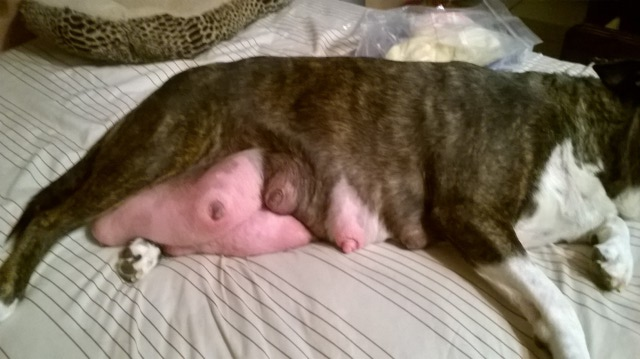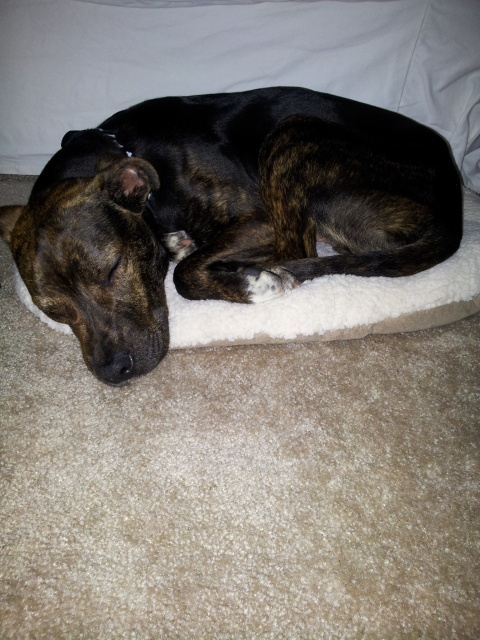QuestionI am in E Indonesia and have two rottweilers, father and son - 7 yr and 4 yrs.
The father is suffering from conjunctivitis (translates here as red-eye) - until a week ago we had had no rain for 4 or 5 months so there was a lot of dust about - he made it worse by kicking up the dust,and nose down checking out smells, all the time when we were walking/exercising. I have to clean the eyes (and eyeballs even) every day, two or three times with a wet cloth. He won't let me get near with an eyedropper - I am afraid of jabbing his eye as he starts shaking his head about when he sees the dropper within 4 or 5 ins of his face.
Yesterday I noticed his ear is all puffed up now and feels like a fluid inside. I can't see any sign of a wound on the skin but he will persist in laying down in a form of dust "wallow" beside the back door(outside the window where I am writing this).
A Balinese friend (Sanjeevini practitioner) supplied me with some "charged" water but I have been unable to use it. The first time I tried to clean his lids (and under eye) he reacted so violently I couldn't continue.
So pl help me out. The local vet keeps prescribing antibiotics and multi-vitamins and the red-eye gets better - and then worse again. What herbal remedies do you recommend I can possibly use - find local equivalents here - to treat the red-eye and swollen ear. (I am trying to use a form of poultice for the ear but it is very difficult - his size doesn't help either).
Local farmers are growing a "wonder"?? medicinal herb here - ashitaba (anti-oxidant levels even greater than green tea) but before trying this I would like to have some feed back from yourself to be able to compare vitamin properties with any of yr recommendations pl.
Any help you can give pl would be gratefully appreciated.
I look forward to hearing from you soon.
Sincerely,
Peter Crick
AnswerHi Peter,
If your dog's conjunctivitis gets better after antibiotics are administered, but the condition returns, it sounds like your dog wasn't receiving the antibiotics for a long enough period of time.
The consistency of the discharge often helps determine the cause of conjunctivitis. Usually infections caused by bacteria, fungi, etc., create a thick yellowish or greenish eye discharge. The eyelids may actually stick together when held shut. This results from the accumulation of white blood cells or 'pus' excreted into the area in an effort to fight off the infection. This type of discharge is also typical of a condition called Keratoconjunctivitis sicca, or 'dry eye,' in which insufficient tears are produced. Allergies, on the other hand, generally cause a clear or watery discharge.
Keratoconjunctivitis sicca (KCS) is most commonly confused with bacterial conjunctivitis. KCS can be diagnosed by a very simple and quick test called the Schirmer Tear Test (STT).
The hallmark of KCS is the presence of mucus-like eye discharge in a dog with a history of non-specific recurrent conjunctivitis. The eyes look like a bacterial conjunctivitis infection, and this is often the reason for the misdiagnosis.
This type of conjunctivitis requires lifelong treatment. Most cases of KCS are managed rather than cured, tear replacement and tear stimulation form the mainstay of therapy. Corticosteroid eye drops and topical anti-inflammatory or anti-bacterial drugs may also be needed depending on the severity of the condition.
Since this is a recurring condition, at this point it probably would be a good idea to have a culture and sensitivity test to determine if bacteria is the cause, and if so, what medication would best be used for treatment. Rather than using eye drops, ointments can be used instead. They last longer and are usually applied less often during the day than drops.
There is a holistic treatment called "PetAlive Eye-Heal", it's said to work for conjunctivitis, but I have no experience with it. You can buy it online at:
http://www.nativeremedies.com/petalive/eye-heal-conjunctivitis-treatment.html
Here is a short video with instructions on how to give a dog eye drops and eye ointment, maybe you can see something that would help in medicating your dog:
http://www.videojug.com/film/how-to-give-your-dog-eye-drops
Vitamins won't help a bacterial infection. When supplementing a commercial food, it's important to know what vitamins and minerals the food contains and in what amounts, because with many vitamins and minerals, too much is just as dangerous as too little.
I have no idea what "charged water" might be, nor am I familiar with the local wonder medicinal herb your local farmers can give you. I'd be wary of using anything you didn't first research, since what's good for people can be toxic to dogs.
You can treat mild bacterial conjunctivitis at home by flooding the eye with saline solution or artificial tears. Be sure to avoid artificial tears that also contain ingredients for relieving red eyes since they may be harmful for pets.
To clean the discharge around your dog's eyes dip a cotton ball into a mixture of warm water and boric-acid solution 50/50. Squeeze a few drops of this in each eye. If the infection is in both eyes, use two separate cotton balls, one for each eye twice a day.
You can also try soaking two used tea bags in warm water(regular black tea, or green tea - one for each eye) and squeeze a tea bad so that it drips into each eye. Do this 2-3 times a day. I've never used this treatment, but it's said to work on mild conjunctivitis.
Treating for bacterial conjunctivitis won't help if your dog has the KCS form of conjunctivitis.
Regarding your dog's ear, is he scratching his ear, rubbing it, or shaking his head? Does the ear have a strong odor? Is there any discharge?
Ear infections are most frequently caused by bacteria, fungus, ear mites or a combination of these. The type of treatment depends on the cause of infection. Generally, treatment includes cleansing the ear with a special solution formulated to break down the wax and discharge, followed by medication to kill the mites, bacteria or fungus. In severe or chronic infections, the veterinarian may culture the ear to determine more accurately the cause of infection and the best medication.
Dampen a cotton ball with mineral oil or ear cleaner and get to work. Hold the ear flap up with one hand and wipe it with the other. Wrap another dampened cotton ball around your finger and insert it gently into the canal as far as you can. Do not poke! Wipe out all the folds and crevices, but wipe gently. You may need to use several cotton balls to properly clean the ears.
If the ear is extremely dirty or filled with dry, caked debris, you may want to fill the canal with ear cleaner(per directions from your vet) before wiping it out with cotton balls. To do so, hold up the ear flap with one hand and with your other, squirt a small amount into the canal. (Many dogs will resist this. Try to bring the cleanser to room temperature beforehand to make the solution less shocking.) Massage the base of the ear for a few minutes, let the dog shake his head and then clean the ear with cotton balls.
I should mention that chronic conjunctivitis and chronic ear infections may be caused by hypothyroidism, so you may want to talk that over with your vet, and have thyroid tests run.
I really hope I've been a help. Please feel free to write back if I can be of further help.
Best of luck,
Patti

 Engorged Breasts
Question
mamma
My Friends Dog Had A Litter About
Engorged Breasts
Question
mamma
My Friends Dog Had A Litter About
 Cant afford medical care for my yorkie
Question
Mr. Bojangles BoBo
Hi, I adopted
Cant afford medical care for my yorkie
Question
Mr. Bojangles BoBo
Hi, I adopted
 mixed breed dog
QuestionSweetie Monster
QUESTION: hi this may be
mixed breed dog
QuestionSweetie Monster
QUESTION: hi this may be
 Anxiety separation????
Question
donovan
HI then, I got my schnauzer when it w
Anxiety separation????
Question
donovan
HI then, I got my schnauzer when it w
 8 month old rescue has crate-phobia
Question
His name is Pepper
Please help. We adop
8 month old rescue has crate-phobia
Question
His name is Pepper
Please help. We adop